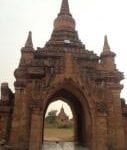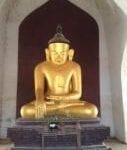Written by Thu Tran, MD,FACOG
April 15, 2014

I have always been one of those who gets confused about the concept of my life being operated by a “master plan” that is inescapable as my religious friends (even some family members) have tried in vain to explain to me.
How does such a master plan work? Some say you can’t escape what was planned for you, as it is all in God’s hands and will!
But what’s about free will? Why would God want me to have an unmeaningful life where I can do all the right things, those discussed in “his” bible, yet I might end up with a tragic, unjust outcome anyway?
What kind of a God is that? Some of my friends can’t come up with the answer, others say God planned several paths for us and depending on which one we chose, we will end up with the planned outcome for that path. The latter at least sounds more reasonable. It’s like me telling my son to study hard so he can have an adequate future. Not studying hard and you’ll end up working in fast food restaurants, I have told him. He picks the path and he will be responsible for the outcome.
When I travelled to Tanzania, or now Myanmar, however, I realized the main problem with this concept of our fate is our inability to pick a continent on which we want to be born. How did our destiny begin? Is there a meeting in heaven where God asks someone which country or continent he wants to be born on to have a fair start? If he picks Tanzania, El Salvador, Vietnam or Myanmar (Burma), he might be “doomed” from the beginning!
I don’t think there is such meeting in heaven. Maybe I’m a fool, but I believe life runs on random beats. I think that it is more of a “fair” God’s will where we have to fight for our own fate and learn whatever we can learn for the brief existence that this creator designed for us. To be born in America or Europe, one already has a jump start.
I further believe that many of us in the industrial world create our own stress. We run amok with our busy jobs alongside our children’s music lessons and traveling sports and schoolwork.
People in many third world countries, however, have very little control over their lives. Their fate is determined by a small group of people who may have selfish interests or an ego so enormous that they want to oppress their countrymen in order to maintain their power.
To be born in such country, one’s “master plan” already is predetermined, not by a supposed to be loving God, but by some humans who gravely lack a sense of humanity.
That kind of “free will design” would prevent me from having the notion of a God who is either unjust or who simply doesn’t care. The world, in my mind, operates like a safari. I remember screaming out as I saw a baby wildebeest being attacked by a cheetah.
“Why doesn’t someone help? Please, someone needs to help him.”
I was told that what a safari was meant to do, was to allow you to see how the animal kingdom operates naturally – how one observes Darwin’s theory of survival of the fittest in nature. In some parts of the world where a dictator is a country’s ruler, the human condition is no different than the animal condition as seen on a safari.
Myanmar is among the poorest countries in the world although it used to be the richest one in Asia. It is larger in area than France but it’s population is a relatively tiny 60 million (especially compared to the huge populations of its neighbors India and China).
A dictator took over the country a few decades ago and changed it for the worse. The healthcare and education systems were dismantled . The economy plummeted and its people were “chained” and prevented from marching forward into progressive civilization as in other countries.
Myanmar (or old Burma), as many of you recall, is home of Aung San Suu Kyi, the 1991 Nobel Laureate (Peace Prize) who was under home arrested from 2000 to May 2002 for her work toward democracy. She was arrested again from May 2003 and released in November 2010 by the military authorities. During her arrest, she refused to have her freedom in exchange for exile from Myanmar. In 2011, Suu Kyi left Yangon for the first time in eight years and she was elected to the lower house of the Burmese parliament as a member of the parliament in 2012. She plans to run for Myanmar’s presidency next year, although she will be facing many obstacles including a clause in the constitution which prohibits her from ascending the presidency. The clause forbids the presidency to anybody with foreign children. As you recall, Suu Kyi was married to a Britishman (now deceased) and has two children who are British citizens.
Myanmar has remained an ancient society where people labor all day for the most basic tasks that have been replaced by machines in other societies. Many of these tasks are performed by children. In the countryside, people still live in grass huts without running water or electricity. As the evening falls, you can see the silhouettes of children in front of their grass huts.
The maternal and newborn death rate in Myanmar is very high. People also have major problems with infectious diseases such as Malaria, tuberculosis and HIV AIDS.
The government in 2011 has re-opened its door to the West but still has a high suspicion of westerners.
The healthcare system in Myanmar, as I mentioned previously to my friends, is troublesome with some areas having 751 maternal deaths out of 100,000 deliveries.
One of the woman hospitals I visited during this trip had a 30% newborn death rate last year! In addition, there was a much higher ratio of deaths to the number of hospital admissions, showing how a woman can die more easily entering a hospital in Myanmar.
Some of my friends think I went on this mission to make myself feel better, that I am among those who need to do charity work to reassure myself that I am a good person.
I disagree with that view. I hope my ego is not so big that I have to bestow good on others in order for me to feel good.
I have always believed in doing charity work and strongly believe it is a duty for those who have the means and capacity to do it. I’m always fond of that term “Thy brother’s keeper.”
I have always admired volunteers in the third world such as the Peace Corps or Doctors Without Borders. They are among the true peace keepers. By helping the locals in these communities to better their lives, the volunteers have extended a hand of friendship and fostered a deeper and more mutual understanding.
Friendship is an important component of peace making and understanding. The hard and unselfish work of volunteers helps the world to be a safer place for those present but so for the generations to come.
Do I think I will save the people of Myanmar? Not on any large scale, at least not yet. My father was too practical for me to follow his advice. He was just worrying about me, as he heard of the multiple conflicts in Myanmar .
“Why don’t you stay home and send the money over to help them? So you think you are the only doctor who can take their blood pressure? Your help will be like a drop of water in a bucket.”
He desperately tried to convince me to cancel the trip. What I didn’t point our to my father was the important role of a drop of water. One drop above the top and the bucket will spill. Big or small, we each make a difference in our surroundings! Our action matters , as the Quakers have their famous motto “Let your life speak!”
It is important, I have told my friends so many times, to do God’s work instead of sitting passively in the pulpit Listening to his words before heading to a Sunday brunch in some fancy restaurant with the family or to some other activity.
So with a heart full of hope and a spirit ready to serve the forgotten part of the human race, I embarked on this trip to Myanmar.
“And this wise man asked me to stop. He said, stop asking God to bless what you’re doing . Get involved in what God is doing — because it’s already blessed.”
Bono (U2)
Tags:





